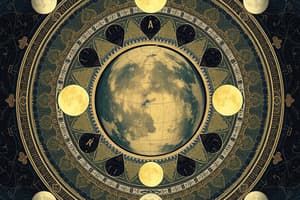Podcast
Questions and Answers
What phenomenon occurs when the moon is directly in the shadow of the Earth?
What phenomenon occurs when the moon is directly in the shadow of the Earth?
- Solar eclipse
- Partial eclipse
- Lunar eclipse
- Total eclipse (correct)
Why does a lunar eclipse occur?
Why does a lunar eclipse occur?
- The moon is in a position directly above or below the Earth's orbit.
- The moon's orbit intersects with the Earth's orbit twice during one month.
- The moon's orbit is slightly tilted about the Earth's orbit.
- The moon passes directly in the shadow of the Earth during the full moon phase. (correct)
When does a partial eclipse occur?
When does a partial eclipse occur?
- During a full moon phase
- When the moon's orbit intersects with the Earth's orbit
- When the moon is directly in the shadow of the Earth
- When the moon partially passes into the Earth's shadow (correct)
What causes a lunar eclipse to take place?
What causes a lunar eclipse to take place?
What is required for a solar eclipse to be total?
What is required for a solar eclipse to be total?
What is the duration of a total lunar eclipse in the twenty-first century?
What is the duration of a total lunar eclipse in the twenty-first century?
Where can a total lunar eclipse in the twenty-first century be seen?
Where can a total lunar eclipse in the twenty-first century be seen?
What equipment was used to observe the eclipse at the Al-Biruni Observatory in Mecca?
What equipment was used to observe the eclipse at the Al-Biruni Observatory in Mecca?
What is unique about a total solar eclipse?
What is unique about a total solar eclipse?
Why should the sun not be looked at directly during a total solar eclipse?
Why should the sun not be looked at directly during a total solar eclipse?
In what phase must the moon be for a solar eclipse to occur?
In what phase must the moon be for a solar eclipse to occur?
Why was the 11/14/1439 AH lunar eclipse called the eclipse of the century?
Why was the 11/14/1439 AH lunar eclipse called the eclipse of the century?
"The Earth, the Sun, and the Moon often do not fall on a straight line" - Why is this mentioned in relation to solar eclipses?
"The Earth, the Sun, and the Moon often do not fall on a straight line" - Why is this mentioned in relation to solar eclipses?
What should be located between the sun and the observer's position for a solar eclipse to be total?
What should be located between the sun and the observer's position for a solar eclipse to be total?
Flashcards are hidden until you start studying



